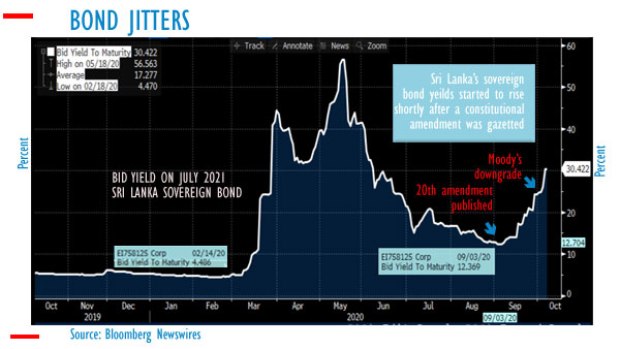Sri Lanka sovereign bond yields rise after constitutional amendment, downgrade
COLOMBO – Sri Lanka’s sovereign bond interest rates, which started to rise the day after a new constitutional amendment was gazetted in September had increased further after a credit downgrade, data showed, amid hopes that yields will stabilize after the repayment of a billion dollar bond.
When the interest (yield) demanded from a bond by investors due to perceived risk goes up in the secondary market the trading price of the bond falls.
Sri Lanka’s sovereign bond yields soared the second quarter of 2020 amid a global coronavirus crisis and a falling rupee but started to ease after Sri Lanka said the 2020 October bond would be repaid and the country would not default.
But yields reversed direction shortly after a constitutional amendment was published on September 3, data showed.
The yield of a bond maturing on July 2021 initially rose from around 4.9% in February 2020 to 56% by May 15 (from around 102 cents or a premium to face value to 61 cents to the dollar or a steep discount), data from Bloomberg Newswires showed.
The yield then fell steadily to 12.5% (the price rebounded to around 95 cents to the dollar from 61) until September 3 when the constitutional amendment was gazetted. The interest rate demanded by investors then started to rise and bond prices began to fall again.
By the time Moody’s downgraded Sri Lanka’s credit to CCC+ on September 28 the yield of the July 2021 bond had doubled to 24% (price fell back to 90 cents to the dollar).
Since the downgrade yields had risen further to around 29% (84 cents to the dollar) on the July 2021 bond. Similar trends were seen in other bonds.
Sri Lanka repaid an October 2020 sovereign bond on October 2 (the bond matured on a Sunday), raising expectations that prices would stabilize.
“This settlement reconfirms the government’s unwavering commitment to honour its foreign liabilities, thereby bolstering investor confidence and dispelling any concerns foreign investors may have in relation to the Government’s ability and willingness to maintain its unblemished debt servicing record,” the central bank said.
“With the envisaged inflows to the domestic foreign exchange market supported by proactive measures taken by the government and the Central Bank of Sri Lanka, the market sentiment is expected to further strengthen in the period ahead.”
Sri Lanka’s economy is expected to contract in 2020, though much less than most other countries but the country is under import controls. There is also excess liquidity in money markets.
-economynext.com


